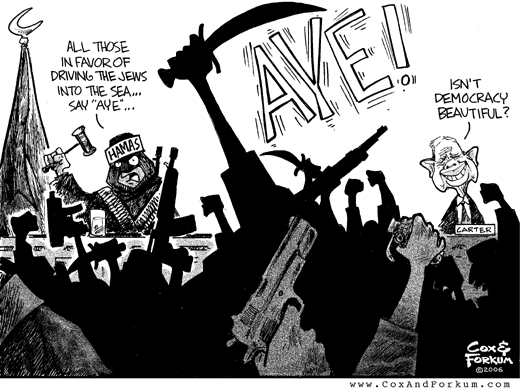Hezbollah, which has been waging war on Israel, and America, for years, is the immediate cause of the current fighting in the Middle East. The broader cause, though, is the United States government.
When Washington declared that freedom could be advanced by elections in which Hezbollah participated, and by which it became part of Lebanon’s government, we granted that terrorist entity something it could never achieve on its own: moral legitimacy.
We gave legitimacy to Hezbollah–just as we did to such enemies as Hamas in the Palestinian Authority and the budding theocrats in Iraq and Afghanistan. These people all came to power through democratic elections promoted by the U.S. But a murderer does not gain legitimacy by getting elected to the ruling clique of his criminal gang–nor does anyone gain it by becoming an elected official of an anti-freedom state.

The premise behind the Bush administration’s policy is the hopeless view that tyranny is reversed by the holding of elections–a premise stemming from the widespread confusion between freedom and democracy.
The typical American realizes that there ought to be limits on what government may do. He understands that each of us has rights which no law may breach, regardless of how much public support it happens to attract. An advocate of democracy, however, holds the opposite view.
The essence of democracy is unlimited majority rule. It is the notion that the government should not be constrained, as long as its behavior is sanctioned by majority vote. It is the notion that the very function of government is to implement the “will of the people.” It is the notion espoused whenever we tell the Lebanese, the Iraqis, the Palestinians and the Afghanis that the legitimacy of a new government flows from its being democratically approved.
And it is the notion that was categorically repudiated by the founding of the United States.
America’s defining characteristic is freedom. Freedom exists when there are limitations on government, imposed by the principle of individual rights. America was established as a republic, under which the state is restricted to protecting our rights. This is not a system of “democracy.” Thus, you are free to criticize your neighbors, your society, your government–no matter how many people wish to pass a law censoring you. You are free to own your property–no matter how large a mob wants to take it from you. The rights of the individual are inalienable. But if “popular will” were the standard, the individual would have no rights–only temporary privileges, granted or withdrawn according to the mass mood of the moment. The tyranny of the majority, as the Founders understood, is just as evil as the tyranny of an absolute monarch.

Yes, we have the ability to vote, but that is not the yardstick by which freedom is measured. After all, even dictatorships hold official elections. It is only the existence of liberty that justifies, and gives meaning to, the ballot box. In a genuinely free country, voting pertains only to the means of safeguarding individual rights. There can be no moral “right” to vote to destroy rights.
Unfortunately, like President Bush, most Americans use the antithetical concepts of “freedom” and “democracy” interchangeably. Sometimes our government upholds the primacy of individual rights and regards one’s life, liberty and property as inviolable. More often, however, it negates rights by upholding the primacy of the majority’s wishes–from confiscating an individual’s property because the majority wants it for “public use,” to preventing a terminally ill individual from ending his painful life because a majority finds suicide unacceptable.
Today, our foreign policy endorses this latter position. We declare that our overriding goal in the Mideast is that people vote–regardless of whether they value freedom. But then, if a religious majority imposes its theology on Iraq, or if Palestinian suicide-bombers execute their popular mandate by blowing up Israeli schoolchildren, on what basis can we object, since democracy–“the will of the people”–is being faithfully served? As a spokesman for Hamas, following its electoral victory, correctly noted: “I thank the United States that they have given us this weapon of democracy. . . . It’s not possible for the U.S. . . . to turn its back on an elected democracy.” All these enemies of America–Hamas, Hezbollah, the Iranian-backed Shiites–abhor freedom, while adopting the procedure of democratic voting.
If we are going to try to replace tyrannies, we must stop confusing democracy with freedom. We must make clear that the principle we support is not the unlimited rule of the majority, but the inalienable rights of the individual. Empowering killers who happen to be democratically elected does not advance the cause of freedom–it destroys it.
Cartoons by Cox and Forum.



